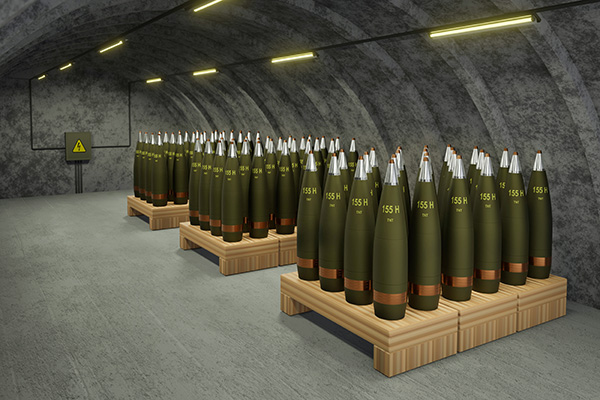The European Commission adopted on Wednesday a proposal for a new regulation to ramp up the EU’s capacity to produce ammunition in response to the war in Ukraine and the need to address the current shortage of ammunition and missiles.
The proposal, the Act in Support of Ammunition Production (ASAP), focuses on track 3 of an EU plan adopted by the Council on 20 March to urgently deliver ammunition and missiles to Ukraine and to help the member states refill their stocks.
The other two tracks in the short-term perspective consist of supplying Ukraine with shells from the existing stockpiles of the member states (track 1) and to launch a joint procurement process on their behalf to replenish the stockpiles and to deliver more shells to Ukraine (track 2).
Thierry Breton, Commissioner for Internal Market, described ASAP as an unprecedented measure when he presented the proposal at a press conference (3 May). “We want to directly support, with EU money, the ramp-up of our defence industry for Ukraine and for our own security.”
Over the past weeks, he has been visiting the EU’s main ammunition production sites in France, Germany, Spain, Sweden and other countries to get first-hand information about their production capacity. While admitting that the capacity is under pressure and does not have the scale today to meet the security needs of Ukraine and the EU member states, he was optimistic that the capacity could be ramped up with EU funding.
“I am confident that within 12 months we will be able to increase our production capacity to 1 million rounds of ammunition per year for Ukraine,” he said. The boost to Europe’s defence industry is expected to reduce the time-line for producing the ammunition from two years to one year.
The proposal consists of two main pillars. Financially, the Commission proposes to allocate a budget of €500 million in co-financing (40 %) from existing EU programmes to expand and modernize ammunition production in Europe. As an incentive to engage in joint ventures to build up an interconnected platform, the defence industry will receive a bonus of 10 %. In total, the investment is worth €1 billion.
The second pillar is of regulatory nature and consists of a mechanism to map, monitor and better anticipate the existence of bottlenecks in the supply chains and the introduction of a temporary regulatory framework to address the ammunition supply shortage. The mapping exercise will be conducted by the Commission together with the member states.
Commissioner Breton underlined that it was important to have the ammunition production facilities in Europe but did not exclude that components in the supply chain could be imported from outside Europe.
The Commission has adopted the proposal as a matter of high priority and transmitted it to the co-legislators (the European Parliament and the Council) on the very same day as it was presented. It now counts on a swift adoption, before the end of June 2023.
The second track is implemented by the European Defence Agency (EDA). This is still in the start of the process and EDA is not in a position to specify the lead time to delivery of the shells to Ukraine, according to a FAQ document dated 4 April. As previously reported, the European Court of Auditors (ECA) has recently carried out an audit of EU defense spending which also involved EDA.
The Commissioner did not directly address the current bottlenecks in the implementation of track 2.
Update: HR Josep Borrell twitted on Wednesday evening, after the presentation of ASAP, that “member states just agreed on so-called track 2. This will allow to use €1 billion from European Peace Facility #EPF for joint procurement and help deliver 1 million rounds of ammunition over 12 months”. The decision was taken ca 1,5 months after the three-track plan to supply ammunition to Ukraine was announced.
M. Apelblat
The Brussels Times

